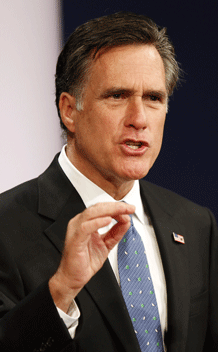What Would Mitt Romney Do About Iran?
More on:

Mitt Romney sat down with the editors of the Washington Examiner earlier this week. One of the questions that came up was whether he “could support the use of force to prevent Iran from getting a nuclear weapon.” His answer is worth quoting in its entirety:
The endgame begins with thoroughly understanding the options that we have. That’s not something that I’ve been briefed upon. I have not sat down with U.S. military and said, all right, lets look at the widest array of military options that we have.
One of the reasons that we do that is so that Iran realizes that we’re doing that, that we’re thinking through those options to consider what they are. If we have plenty of effective options, why, that would be a very fortuitous circumstance. If we have very limited options, that would be more challenging.
Every now and then I hear people say, "Why don’t we have Israel go and do it?" I say, well, can Israel go and do it? Do they have the capacity to do it? And of course, part of any discussion of military options is what the military response will be from Iran. So, there are many options that we have but those options that do not result in our being hurt as badly or even worse than what we’ve carried out, obviously that’s not an option that we’d consider.
So I can’t tell you Michael what the options would be that would have the most promise for stopping nuclear Iran and at the same time, not resulting in severe retribution on our friends or on ourselves. And so the options range from those that are the most modest, to things like like a blockade of gasoline, to those which are most extreme.
And I meet with a number of former military officers, and they describe their views, but those do not necessarily conform with the realities that I hear from military experts today. But some of those that I have spoken say, Mitt, if you were to think you could go in and surgically take out a few sites, recognize that in doing so you would engender enmity from the people of Iran and a very severe military response. And they describe the kinds of responses that might occur. And their point is therefore if you were actually planning on attacking and taking out certain sites, you’d probably need to think about something far more expansive than just those sites, including decapitating the regime, including an onslaught of attack on the military capabilities of Iran, and so forth.
Well, are those things real or not real? That’s something which I could only assess in being able to have a full military analysis, which I don’t know if that’s been done or not. The interesting thing to me is, I think in order to get Iran to be dissuaded from their nuclear folly, that they need to see crippling sanctions, they need to see efforts behind the scenes at regime change. They need to be treated as pariah throughout the world, I’d indict Ahmadinejad under the genocide convention. I think you go after him in every possible way and they have to see that there is a very high probability that someone’s going to go after them militarily if they pursue their course. And that combination has the best prospects in my view of dissuading them from their nuclear ambition.
Romney’s answer here is notable for exploring the complexity of the Iran issue, something that his higher profile comments about President Obama’s “appeasement strategy” don’t do. Romney acknowledges that he does not know yet whether a military strike would work, he recognizes that the potential benefits of any strike could be swamped by the backlash it produces, and he knows that experts are of differing minds on the wisdom of military action.
Romney’s answer is also notable because, with the exception of the brief reference to “regime change,” it sounds a lot like current U.S. policy. So even if the political rhetoric about Iran gets red hot on the campaign trail, don’t assume that a Romney administration would be hell-bent on taking military action against Tehran.
More on:
 Online Store
Online Store